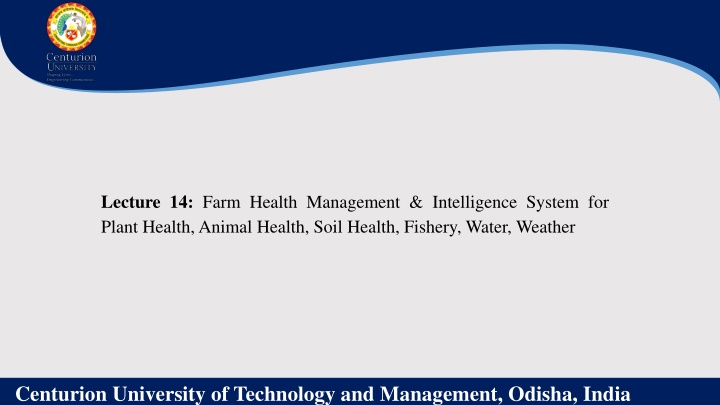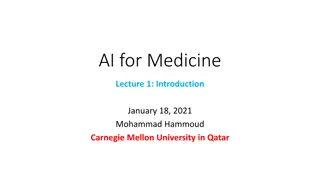
Farm Health Management & Intelligence Systems: Enhancing Agricultural Productivity
Farm health management and intelligence systems leverage data and technology to monitor and improve the health of plants, animals, and soil on farms. These systems enable farmers to track soil health, monitor plant and animal health data, detect diseases, and make informed decisions to enhance agricultural practices. By providing insights and recommendations, these systems help farmers optimize crop yields, reduce environmental impact, and boost profits. Centurion University of Technology and Management in Odisha, India, emphasizes the importance of such systems in modern agriculture.
Download Presentation

Please find below an Image/Link to download the presentation.
The content on the website is provided AS IS for your information and personal use only. It may not be sold, licensed, or shared on other websites without obtaining consent from the author. If you encounter any issues during the download, it is possible that the publisher has removed the file from their server.
You are allowed to download the files provided on this website for personal or commercial use, subject to the condition that they are used lawfully. All files are the property of their respective owners.
The content on the website is provided AS IS for your information and personal use only. It may not be sold, licensed, or shared on other websites without obtaining consent from the author.
E N D
Presentation Transcript
Lecture 14: Farm Health Management & Intelligence System for Plant Health, Animal Health, Soil Health, Fishery, Water, Weather Centurion University of Technology and Management, Odisha, India
FARM HEALTH MANAGEMENT AND INTELLIGENCE SYSTEM FOR PLANT HEALTH A farm health management and intelligence system for plant health is a system that uses data and technology to help farmers monitor and manage the health of their crops. This can include monitoring soil health, water quality, pest and disease levels, and crop yields. The system can also provide farmers with insights into how to improve their farming practices and reduce their environmental impact. Data collection: The system collects data from a variety of sources, such as sensors, weather stations, and satellite imagery. Data analysis: The system analyzes the data to identify patterns and trends. Decision support: The system provides farmers with insights and recommendations to help them make informed decisions about their farming practices. Communication: The system allows farmers to communicate with each other and with experts. Farm health management and intelligence systems can be a valuable tool for farmers. By providing farmers with data and insights, these systems can help them to improve the health of their crops, reduce their environmental impact, and increase their profits. Centurion University of Technology and Management, Odisha, India
FARM HEALTH MANAGEMENT AND INTELLIGENCE SYSTEM FOR ANIMAL HEALTH A farm health management and intelligence system for animal health is a system that uses data and technology to help farmers monitor and manage the health of their animals. This can include tracking animal health data, such as weight, body temperature, and feed intake, as well as detecting and responding to diseases. Animal identification and tracking systems: These systems use tags or sensors to track the movement and location of animals. This information can be used to monitor animal health and to identify potential problems. Hmonitoring systems: These systems use sensors to collect data on animal health, such as temperature, weight, and feed intake. This data can be used to identify potential problems and to track the health of animals over time. Disease detection systems: These systems use sensors or laboratory tests to detect diseases in animals. This information can be used to respond to diseases early on and to prevent them from spreading. Centurion University of Technology and Management, Odisha, India
FARM HEALTH MANAGEMENT AND INTELLIGENCE SYSTEM FOR SOIL HEALTH A Farm Health Management & Intelligence System (FHMS) for soil health is a system that uses data and technology to help farmers manage their soil health. It can help farmers to: Track soil health: The system can track soil health over time, so farmers can see how their soil is changing and make adjustments as needed. Identify problems: The system can identify problems with soil health, such as nutrient deficiencies or compaction. Recommend solutions: The system can recommend solutions to problems with soil health, such as adding amendments or changing tillage practices. Improve decision-making: The system can help farmers to make better decisions about soil management, such as when to plant, what crops to grow, and how much fertilizer to apply. Centurion University of Technology and Management, Odisha, India
FARM HEALTH MANAGEMENT AND INTELLIGENCE SYSTEM FOR FISHERY A Farm Health Management & Intelligence System (FHMIS) for fishery is a system that uses sensors, data analytics, and artificial intelligence to monitor and manage the health of fish farms. This can help to improve fish health, prevent diseases, and increase productivity. A FHMIS typically includes the following components: Sensors: Sensors are used to collect data on the environment in the fish farm, such as water quality, temperature, and pH. Data analytics: Data analytics is used to analyze the data collected by the sensors to identify potential problems. Artificial intelligence: Artificial intelligence is used to make predictions about fish health and to recommend actions to take. Centurion University of Technology and Management, Odisha, India
FARM HEALTH MANAGEMENT AND INTELLIGENCE SYSTEM FOR WEATHER A Farm Health Management & Intelligence System (FHMIS) for weather can be a valuable tool for farmers to monitor and manage their crops in response to weather conditions. Such a system would typically collect data on weather conditions, such as temperature, humidity, rainfall, and wind speed, and then use this data to generate insights into how these conditions are affecting crop growth and health. Improved crop yields: By monitoring and managing crops in response to weather conditions, farmers can reduce the risk of crop losses and increase their yields. Reduced risk of crop damage: By forecasting future weather conditions, farmers can take steps to protect their crops from adverse weather events. Increased efficiency: By using a FHMIS for weather, farmers can make better decisions about how to manage their crops, which can lead to increased efficiency. Reduced costs: By reducing the risk of crop losses and damage, farmers can save money on crop insurance and other expenses. Centurion University of Technology and Management, Odisha, India











